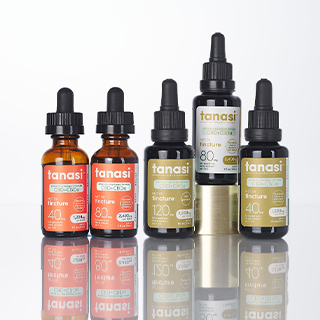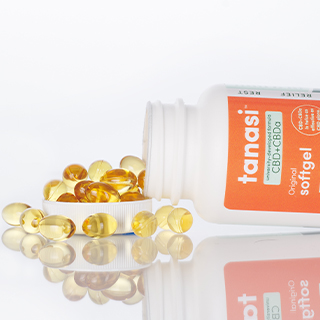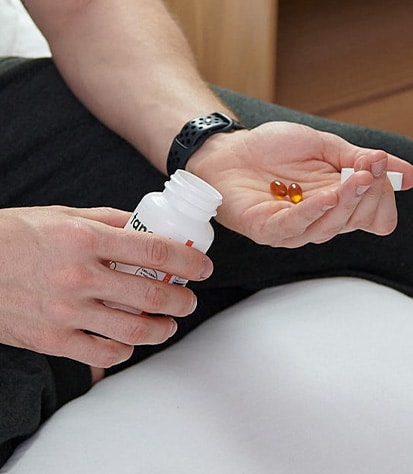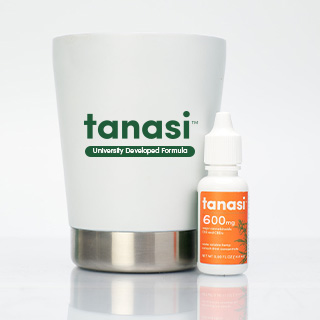CBD Effects on Dopamine

Posted on August 19th, 2020
Before we talk about how CBD affects systems in your body, we must answer one important question: What is CBD? Cannabidiol, better known as CBD, is a chemical compound present in the cannabis Sativa plant. It is the second most common compound in this plant, just below tetrahydrocannabinol, or THC. But unlike THC, CBD does not cause a euphoric high, because it does not have any intoxicating properties. For this reason, many people turn to CBD for help managing symptoms of conditions such as anxiety, chronic pain, and insomnia, to mention just a few. Many find relief because, even though consuming CBD doesn’t trigger psychoactive reactions, it does make other reactions occur within your body and brain. Want to learn more? This blog will educate you on the effects of CBD on dopamine. But first, we’ll explain more about dopamine to help you understand its relationship with CBD.
What Is Dopamine?
You might have heard the word dopamine being thrown around casually, but what is it, exactly? Dopamine is a neurotransmitter that is associated with pleasure and reward. It’s a chemical messenger that your brain makes, releasing it when you expect a reward in pleasurable situations.
Here’s the really neat part: when you associate a particular activity with pleasure and happiness, just anticipating that activity is enough to raise dopamine levels in your body. It could be sex, food, shopping, or even watching a favorite TV show. That’s why dopamine is also called the ‘reward chemical’ because it’s involved in your body’s pleasure-reward system. It’s even referred to as the motivation molecule since it gives you the drive and the focus you need to increase productivity.
 Other Functions of Dopamine
Other Functions of Dopamine
Aside from its “feel good” function, dopamine plays other roles in the human body. It is involved in blood flow and blood vessel functioning; pain processing; motor control; digestion; heart and kidney function; mood regulation; and your emotions.
It doesn’t stop there: dopamine also affects your memory and focus; sleep; stress response; executive functioning; lactation; movement; pancreatic function; insulin regulation; and control of nausea and vomiting.
Dopamine also plays a role in mental health. Having too little or too much dopamine in different parts of your brain is associated with various forms of mental illness.
What Is Dopamine Deficiency?
By itself, dopamine deficiency is not a medical diagnosis. It is a hereditary condition and a genetic disorder that can be passed down through your genetics. Do you feel like you have no interest in life when you wake up every morning? You might be suffering from dopamine deficiency.
Dopamine levels can affect your mental well-being in so many ways. Sadly, it is impossible to measure the levels of dopamine in your brains. However, you can develop this condition through any of the following mechanisms: if dopamine is broken down too quickly; if you have too few or damaged dopamine receptors; or if your body produces inadequate dopamine levels, or circulates the dopamine inadequately. Now that you’re familiar with dopamine deficiency, here’s a look at its potential causes.
Causes of Dopamine Deficiency
Dopamine deficiency is linked to various mental conditions. Scientists have recently discovered that health imbalance, neurological conditions, and intentional substance abuse are all causes of dopamine deficiency. The most prevalent causes of dopamine deficiency are:
Depression
If you think about it logically, dopamine deficiency could cause depression, but the reverse is also true. Depression causes a dip in dopamine levels in your brain. How is this possible, you may ask? A recent discovery by scientists shows that the neurotransmitters produced and spread all over your body are interconnected. If one or many neurotransmitters fall below their critical threshold, the whole network is impacted. Although the dopamine reward system induces physical pleasure, depletion, or disruption of norepinephrine and serotonin may cause wrong signals to be sent to the reward system that produces dopamine.
Parkinson’s Disease
Parkinson’s disease falls under the category of conditions referred to as Motor System Disorders. It is related to the central nervous system, affecting your movement. Since the condition affects balance and coordination, it leads to stiffness, shaking, and difficulties walking. Sadly, as the degenerative disorder progresses, it affects the neurons that process and produce dopamine; eventually, it kills them. Parkinson’s disease, therefore, causes dopamine deficiency by destroying your brain’s ability to produce and transmit dopamine.
Drug and substance abuse
Thanks to dopamine, humans can form memories of pleasurable experiences. With the help of these formed memories, we can repeat pleasurable experiences in the future.
The release of dopamine is also stimulated by alcohol and drugs, and a memory of the sensation is then formed. The cause of addiction usually is this remembered pleasure, rather than the actual substance dependence. The more often you abuse drugs and other substances, the more unstable your dopamine reward system becomes. Consequently, the dopamine reward system may stop functioning.
Other causes of dopamine deficiency are schizophrenia, stress, obesity, and even an unhealthy diet.
Symptoms of Dopamine Deficiency
Signs of insufficient dopamine levels in your body include:
- Depression
- Rapid weight gain
- Low sex drive
- Procrastination
- Restless leg syndrome
- Constipation
- Muscle spasms
- Sleep disorders
- Muscle cramps
- Issues with memory
- Muscle stiffness
 How Does CBD Affect Dopamine?
How Does CBD Affect Dopamine?
According to research, since CBD is not intoxicating like its counterpart THC, it is unlikely to boost dopamine levels or significantly impact your brain’s reward system. However, CBD may help replenish dopamine levels in your brain. It indirectly replenishes dopamine levels by interacting with your body’s endocannabinoid system (ECS) to suppress neurons that inhibit dopamine production. Once these so-called GABA inhibitors are suppressed, your body can produce more dopamine. Here’s a look at how CBD can help replenish your brain’s dopamine level under different circumstances:
Pain
Studies suggest that dopamine may play a vital role in regulating chronic pain. By tracing the pain-signaling pathway between the brain and the spinal cord in an animal model, researchers found that removing dopamine-containing cells reduced chronic pain. CBD can also be administered to combat chronic pain, since it connects to your internal cannabinoid receptors, potentially reducing the intensity of pain signals sent to your brain. Less pain means more of the “feel-good” hormone. So, by helping manage pain, CBD may also help replenish dopamine levels in your brain.
Sleep
Dopamine is linked to alertness and wakefulness. The more dopamine present in your brain, the more alert you become. Conversely, recent studies show that lack of sleep causes a decrease in the availability of certain types of dopamine receptors. This decrease in receptors means dopamine can’t attach itself to anything. Consequently, it gets harder for you to stay awake.
Stress
Studies show that people with high exposure to psychological stress have a reduced ability to produce the dopamine necessary to cope with stressful situations. CBD can be useful in stressful situations, replenishing dopamine levels in your body by suppressing the GABA hormone. CBD thus encourages dopamine production, which in turn fights stress.
Weight Loss
Scientists have shown that CBD may help in weight loss through a process called browning. Browning involves turning white fat into beige fat. What difference does the color of your fat make? Well, white fat gets stored, while brown fat burns excess stores. The consequence of browning is therefore your body’s improved ability to burn calories. CBD plays a part in weight loss by:
- Decreasing calorie intake by lowering appetite
- Promoting fat burning by normalizing insulin levels
- Supporting metabolic health and our mitochondria
But we’re talking about dopamine here, so why do we care about weight loss? Here’s the story: obesity can lead to a decrease in your brain’s dopamine levels. And since CBD has been linked with weight loss, this is yet another avenue through which it helps replenish dopamine levels.
CBD for Parkinson’s Disease
Is CBD a viable and realistic option for managing the symptoms of Parkinson’s disease? The answer appears to be yes, at least according to recent research. Scientists report that CBD can potentially remedy motor symptoms in several neurodegenerative disorders, including Parkinson’s disease.
Parkinson’s disease comes with a range of symptoms, many of which may be targeted by using CBD. Most people who have Parkinson’s disease exhibit symptoms like REM sleep behavior disorder and, in late-stage disease, signs of psychosis. CBD may be very beneficial in combating these symptoms and improving the quality of life for people who have Parkinson’s disease.
CBD for Depression
Can CBD help manage symptoms of depression? According to researchers, CBD may have antidepressant effects. CBD does not work on the dopamine neurons directly. However, cannabidiol interacts with the body’s endocannabinoid system (ECS), temporarily suppressing GABA inhibitors, as we mentioned earlier. Since GABA neurons are responsible for inhibiting the production of dopamine, suppressing them allows for increased dopamine production. And, when dopamine is released, it helps combat depression.
Final Thoughts on the Relationship Between CBD and Dopamine
Although research indicates that CBD cannot directly interact with dopamine neurons, numerous reports suggest it can help remedy several dopamine deficiency symptoms, which, consequently, will boost dopamine levels in your brain.
But keep one important fact in mind as you read this post: most of the information available regarding the effects of CBD on dopamine and the human body is in the earliest stages of research. Even with rigorous studies being done every day since the human body is such a sophisticated vessel, we are still a long way from fully understanding the effects of CBD on your brain and on neurotransmitters such as dopamine. There’s no question that existing studies are exciting and promising, but it would be unwise to draw too many conclusions.
Want to find out more? Explore CBD’s effects on your body by sampling Tanasi’s range of full-spectrum CBD products. Together with help from your doctor, you can decide which form of CBD will be best for targeting your dopamine concerns.

 Other Functions of Dopamine
Other Functions of Dopamine How Does CBD Affect Dopamine?
How Does CBD Affect Dopamine?



